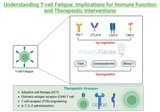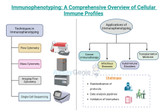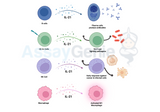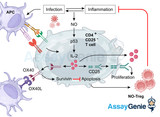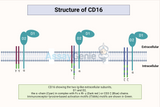Blog
Understanding T Cell Fatigue: Implications for Immune Function and Therapeutic Interventions
T cells are central players in adaptive immunity, responsible for recognizing and eliminating infected or aberrant cells. Upon encountering antigens, T cells undergo clonal expansion and differentiation into effector or memory cells, executing various functions to eliminate the threat. However, in scenarios of persistent antigen exposure, such as chronic infections or cancer, T cells can become functionally exhausted, leading to compromised immune responses. This phenomenon, known as T cell fatigue or exhaustion, has garnered significant attention due to its implications for immune function and therapeutic interventions. Mechanisms of T Cell Fatigue: T cell fatigue is chara
…
9th Apr 2024
Immunophenotyping: A Comprehensive Analysis of Cellular Immune Profiles
Immunophenotyping, a cornerstone of modern immunology, involves identifying and characterizing cell populations based on their surface markers. This technique provides insights into the heterogeneity and functionality of immune cells, enabling researchers and clinicians to elucidate immune responses in health and disease. Immunophenotyping has evolved significantly over the years, from early flow cytometry approaches to multiparameter analyses using advanced technologies such as mass cytometry and single-cell sequencing. Techniques in Immunophenotyping: 1. Flow Cytometry: Flow cytometry remains the gold standard technique in immunophenotyping, allowing for the simultaneous
…
20th Mar 2024
Exploring the Frontier of Immunotherapy: T Cell Expansion
In the realm of immunotherapy, T cell expansion has emerged as a pivotal strategy, holding promise in the treatment of various diseases, particularly cancer. T cells are a critical component of the adaptive immune system, orchestrating immune responses against pathogens and malignant cells. Harnessing the potential of T cells through expansion techniques offers a novel avenue for enhancing their therapeutic efficacy. This article delves into the mechanisms, applications, and advancements in T cell expansion, illuminating its transformative impact on medical science. Understanding T Cell Expansion T cells, a type of lymphocyte, play a central role in adaptive immunity by rec
…
8th Mar 2024
The Intricacies of IL-21 Signaling: Impact on Diverse Immune Cell Types
Interleukin-21 (IL-21) stands out as a pivotal cytokine in the complex network of immune system communication. Its role in regulating various immune cell types has drawn considerable attention from researchers seeking to unravel the intricate web of signaling pathways and biological effects it elicits. In this article, we will delve into the nuanced world of IL-21 signaling and explore its profound impacts on different immune cell populations. IL-21: An Overview IL-21 belongs to the family of cytokines, which are small proteins crucial for intercellular communication. Produced mainly by activated CD4+ T cells, particularly T follicular helper (Tfh) cells and Th17 cells, IL-
…
31st Jan 2024
CD25 Marker
CD25, a key molecule in immune regulation, is integral to the function of activated lymphocytes and regulatory T cells. It's central in mediating immune responses, with implications in autoimmune diseases and cancer. Key Takeaways: CD25, part of the IL-2 receptor, is crucial in immune response regulation. Found on T cells, NK cells, Tregs, and others; upregulated during immune activation. Vital for cellular immune responses and maintaining immune homeostasis. Serves as a biomarker in autoimmune diseases, allergies, and certain cancers. Targeted in immunotherapy for diseases like multiple sclerosis and various cancers. What is CD25? CD25, also known as Cluster o
…
22nd Jan 2024
Understanding CD16: A Comprehensive Overview
CD16, also known as FcγRIII (Fc gamma receptor III), plays a crucial role in the immune system, serving as a receptor for the Fc region of immunoglobulin G (IgG). This receptor is a key player in mediating various immune responses and has implications in both innate and adaptive immunity. In this article, we will delve into the structure, functions, and significance of CD16 in the context of immune regulation. Structure of CD16: CD16 is a transmembrane glycoprotein that belongs to the immunoglobulin superfamily. It exists in two main isoforms: CD16A (FcγRIIIA) and CD16B (FcγRIIIB). CD16A is expressed on the surface of natural killer (NK) cells, macrophages, and
…
5th Jan 2024
Understanding CD16: A Comprehensive Overview
CD16, also known as FcγRIII (Fc gamma receptor III), plays a crucial role in the immune system, serving as a receptor for the Fc region of immunoglobulin G (IgG). This receptor is a key player in mediating various immune responses and has implications in both innate and adaptive immunity. In this article, we will delve into the structure, functions, and significance of CD16 in the context of immune regulation. Key Takeways CD16, also known as FcγRIII, is crucial in both innate and adaptive immunity. There are two isoforms: CD16A on NK cells, macrophages, and neutrophils, and CD16B mainly on neutrophils. Functions include Antibody-Dependent Cellular Cytotoxi
…
5th Jan 2024
Natural Killer Cells: A Guide
What are Natural Killer Cells?
Natural Killer (NK) cells are a vital subset of lymphocytes, belonging to the same family as B cells and T cells, collectively known as lymphocytes. They play a crucial role in the innate immune system, providing a rapid response against infected or cancerous cells without prior exposure or activation. NK cells are named "natural" because they can directly recognize and kill target cells without the need for prior sensitization or antigen presentation.
{
"@context": "https://schema.org",
"@type": "BlogPosting",
"mainEntityOfPage": {
"@type": "Web
…
28th Jul 2023
T cell Immunophenotyping - A Guide
Introduction T lymphocytes are type of white blood cell that plays a crucial role in the immune system. There are many different types of T cells, and it is important to be able to distinguish them accurately in order to study their function. Immunophenotyping is the process of identifying and classifying these different types of T lymphocytes. In this guide, we will discuss the different markers that are used to identify T cells, as well as how to sort them using flow cytometry. We will also look at the different helper T cell subsets and their activation markers. By understanding the basics of immunophenotyping, you can effectively diagnose and treat immune-related diseases
…
18th Jul 2023
Antigen Presenting Cells (APCs) and cancer immunotherapy
Explore antigen presentation's crucial role in adaptive immunity and its impact on cancer immunotherapy, highlighting the diversity and function of MHC class I molecules. Key Takeaways Antigen presentation by MHC class I is key for adaptive immunity. Specialized cells, antigen-presenting cells (APCs), present antigens to T cells. MHC-I molecules' polymorphism enables diverse antigen presentation. Cancer immunotherapy leverages antigen presentation to target tumor cells. What is Antigen Presentation? Our immune system has various mechanisms to defend against pathogens, with adaptive immunity being a crucial component. Adaptive immunity enables our immune syst
…
16th Jul 2023
The PD-1 Pathway and Cancer Immunotherapy
The initial identification of PD-1 as a potential target for cancer treatment occurred in the late 1990s and early 2000s through studies exploring the regulation of T-cell responses. The development and approval of PD-1 inhibitors, such as pembrolizumab and nivolumab, for the treatment of various cancers have since transformed the landscape of cancer immunotherapy. The use of PD-1 pathway inhibitors in cancer treatment has rapidly gained recognition and has become a cornerstone of modern immunotherapeutic approaches.
Table of Content
…
20th Jun 2023
Dendritic Cells - Markers, Activation & Subtypes
Exploring the multifaceted role of dendritic cells in immune function and disease. Key Takeaways DCs are professional antigen-presenting cells that capture, process, and present antigens. They activate T cells and regulate immune responses by producing cytokines. DC markers help distinguish them from other cells. Different DC subtypes exist, each with unique functions. DCs play a vital role in immune surveillance and maintaining self-tolerance. They are involved in autoimmune diseases and cancer, both as protective and harmful factors. DCs have a crucial role in the development and regulation of immune responses. What is a Dendritic Cell? Dendrit
…
12th Jun 2023
ILC2: The Immune Cell That Fights Allergies and Infections
ILC2 - Function, Cytokines, and Role in Health and Disease
A quick guide to IL2C
Our immune system is composed of various types of cells that work together to protect us from harmful pathogens, such as viruses and bacteria. One type of immune cell that has recently gained attention is the innate lymphoid cell type 2 (ILC2). ILC2s are a type of white blood cell that play a critical role in protecting us against infections and allergies. In this article, we will explore what ILC2s
…
25th Jan 2023
T Cell Types, Activation, Polarization & Function
T Cell Types, Activation, Polarization & Function A comprehensive guide to T cells!
window.SHOGUN_IMAGE_ELEMENTS = window.SHOGUN_IMAGE_ELEMENTS || new Array();
window.SHOGUN_IMAGE_ELEMENTS.push({ uuid: 's-97bbabca-f192-454c-a1c7-98716f6875bf' })
Introduction T-cells, vital components of the immune system, encompass various functions and types, including cytotoxic T cells, helper T cells, and regulatory T cells. Their activation and polarization play critical roles in immune responses. Understanding T-cell biology is essential for effective immune defense and therapeutic applications. Key Takeaways T-cells have d
…
12th Apr 2022
Guide to Understanding Th1 and Th2 Cells
window.SHOGUN_IMAGE_V2_ELEMENTS = window.SHOGUN_IMAGE_V2_ELEMENTS || new Array();
window.SHOGUN_IMAGE_V2_ELEMENTS.push({ uuid: 's-19118a5d-7dea-4fc9-8267-6237960845ca' })
The Th1 Pathway In this guide, we will explore the differences between TH1 and TH2 cells, their crucial roles in the immune system, and the contributions of cytokines and transcription factors to their differentiation. Furthermore, we will examine some common diseases associated with these cell types and possible treatment options, providing a comprehensive overview of T helper cell biology and its relevance to human health. Key Takeaways T helper cells (TH1 and TH2) ar
…
9th Mar 2022

